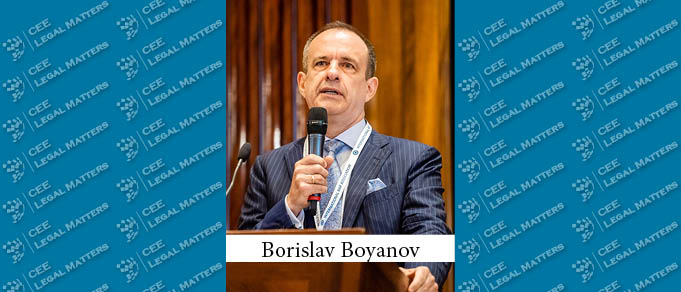Going through hard times, Bulgaria’s newly elected political parties are still unable to form a government, yet the market is showing positive developments in some sectors, according to Boyanov & Co. Managing Partner Borislav Boyanov.
"The country is going through the most complex time in, maybe, the past sixty years, with high energy prices, inflation, disruption in supply chains, and rising concerns about recession and the eventual escalation of the war in Ukraine," Boyanov begins. "Added to this, political instability continues in Bulgaria, as we had four elections in the last two years and, after that, the political parties with seats in parliament are so fragmented that it is not clear whether they will be able to form a government." According to him, one month after the elections, people still "do not see the light at the end of the tunnel."
Still, Boyanov highlights the progress in terms of some parliamentary activities. "Last week, the parliament did vote that Bulgaria will provide weapons to Ukraine, and a discussion has started on anti-corruption rules – but also on a controversial law on the elections process – so certain things have started to move," he says. "Yet, we have a package of more than 20 pieces of outstanding legislation that need to be adopted quickly, in order for Bulgaria to receive portions of the EUR 12 billion funding from the EU as a part of its national recovery and resilience plan." About the anticipated legislation, Boyanov says that "there are sensitive issues, such as the laws related to judicial reform, anti-corruption, transparency, etc."
Regardless of the difficulties, Boyanov reports that there are positive developments in the country. "The country did pretty well after the COVID-19 pandemic. We had a GDP growth of 7.4% in 2021, and during the first two quarters of this year that number is around 4%. When the war started in February, investors practically stopped many activities, but now we see an increasing number of M&A transactions, with Eastern Europe again becoming an attractive destination for investments in infrastructure, ITC, and energy," he notes. Boyanov also says that "during the yearly meeting of the Three Seas initiative – which includes 12 EU countries in CEE – there has been strong participation from Japanese, American, and EU companies showing an increased interest in the region." He adds that "the importance of the region might actually be increasing because of the war."
"We feel that the economy is still doing well," Boyanov continues. "Some sectors, in particular, IT, pharma, construction, defense, and energy have been doing extremely well. We had about a 31% increase in exports and a 33% increase in imports in the first half of the year." As for IT, he notes that "10,000 new people joined IT companies last year, and their revenues increased by EUR 1 billion to almost EUR 9 billion in total. There are acquisitions and investments as well, both from larger Western corporations and from some local companies that have become global players. We also have a first unicorn – Bulgarian fintech company Payhawk."
Still, he notes that there are expectations of a recession. "Last year, Bulgaria’s support for families and businesses has been dramatically increased, which is currently leading to a deficit in the budget. We need to find a solution for that deficit, at the latest, at the beginning of next year, as this is an important socially relevant issue, while also being an economic and political one," he concludes.






















